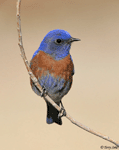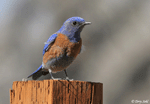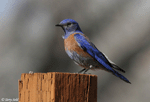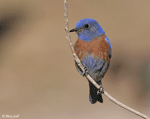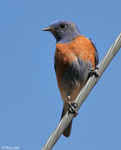| Length: 7.5 inches | Wingspan: 12 inches | Seasonality: Rare Visitor |
|
Identification Keys: Blue upperparts, head, and throat, rusty-orange chest, gray belly. |
||
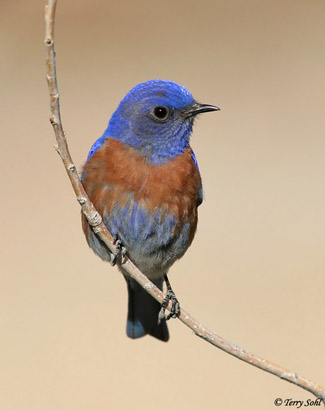 Western Bluebirds
are found in open and semi-open habitats in the western United States.
They are most easily distinguished from Eastern
Bluebirds by range and by their blue throat (compared to rusty orange on an Eastern
Bluebird). Their normal range is a few hundred miles from South
Dakota, and they are considered only very rare visitors to the state.
Western Bluebirds
are found in open and semi-open habitats in the western United States.
They are most easily distinguished from Eastern
Bluebirds by range and by their blue throat (compared to rusty orange on an Eastern
Bluebird). Their normal range is a few hundred miles from South
Dakota, and they are considered only very rare visitors to the state.
Habitat: Found in semi-open and open habitats in all seasons, such as open pine and oak woodlands, riparian bands of trees, pinyon-juniper woodlands, and farmland.
Diet: Insects make up the majority of the diet, but berries and fruits can also be an important food item, especially in the winter when insects aren't as plentiful.
Behavior: Often feeds by perching low in vegetation and swooping down to the ground to snatch insects. They will also fly from a perch to catch insects in mid-air, and will forage among the foliage.
Breeding: Non-breeder in South Dakota
Song: Short sweet warbling.
Migration: Summers throughout the Northwest and Southwest U.S., extreme southwestern Canada, and in Mexico. Those in the northwestern part of their range migrate southward for the winter, but the rest are generally permanent residents.
Interactive eBird map: Click here to access an interactive eBird map of Western Bluebird sightings
Similar Species: Eastern Bluebird
Conservation Status: Numbers strongly declined over much of their range in the 20th century due to loss of natural nesting sites and competition with other songbirds (including introduced species such as European Starlings). However, they appear to be rebounding and increasing in number over the last couple of decades. The IUCN considers the Western Bluebird to be a species of "Least Concern".
Further Information: 1) WhatBird - Western Bluebird
3) Audubon Guide - Western Bluebird
Photo Information: May 1st, 2008 - Zion National Park, Utah - Terry Sohl
Additional Photos: Click on the image chips or text links below for additional, higher-resolution Western Bluebird photos.
| Click on the map below for a higher-resolution view |
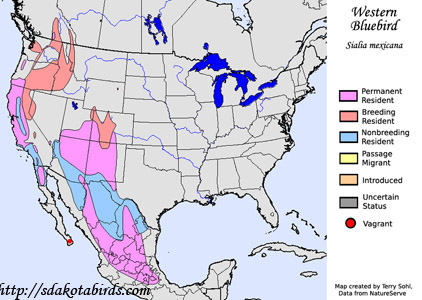 |
| South Dakota Status: Very rare visitor. Normal breeding range is to the west of South Dakota |
Additional Western Bluebird Photos
Click for a higher-resolution version of these photos
